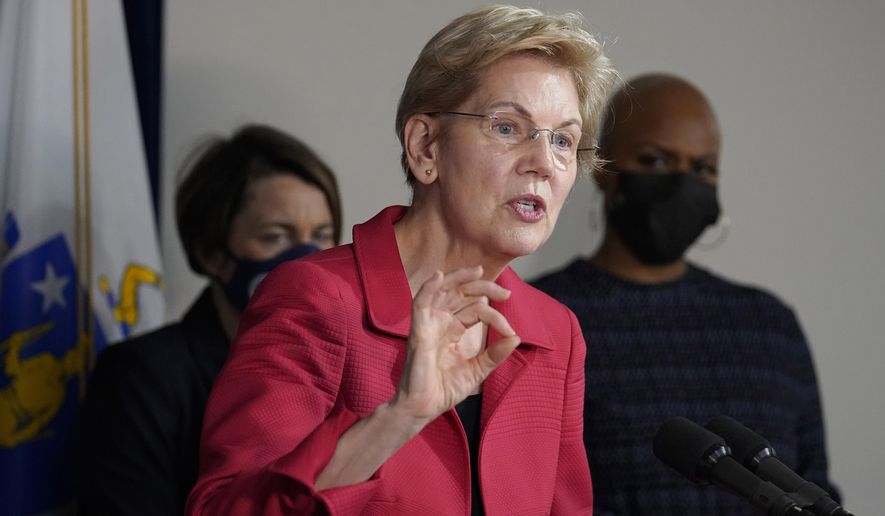Democratic Sen. Elizabeth Warren on Monday proposed paying for part of liberal senators’ $3.5 trillion spending package by closing corporate tax loopholes that she says allow profitable companies to pay nothing to Uncle Sam.
Ms. Warren of Massachusetts said the proposal would raise $700 billion over the next decade.
But while Ms. Warren painted her proposal as making companies pay their “fair share,” a center-right tax policy group warned that by lowering corporate profits, the measure would cost jobs and reduce Americans’ pay.
Still, Ms. Warren and Sen. Angus King, a Maine independent who caucuses with the Democrats, called for rethinking how the nation’s most profitable companies are taxed.
“Now is the time to put revenues on the table to pay for our investments in child care and climate care,” Ms. Warren said Monday. “I believe revenues should come from billionaires and from giant corporations that have evaded taxes for too long,” she said.
Mr. King said it’s unclear if the proposal can win the unanimous support it needs from fellow Senate Democrats to be included in the package.
Democrats are planning to pass the $3.5 trillion “human infrastructure” legislation without any Republican support through a procedure called budget reconciliation.
However, all 50 of the Senate’s Democrats would have to go along, including moderate Sens. Joe Manchin III of West Virginia and Kyrsten Sinema of Arizona. Mr. King said he has not received commitments from either. Spokespeople for both moderates did not immediately respond to inquiries.
Mr. King and Ms. Warren, though, expressed optimism. “I’d be surprised if there’s a lot of resistance,” Mr. King said of his fellow Democrats. “To me, it’s common sense.”
Ms. Warren said President Biden had made a similar proposal during the campaign. “Democrats across the board believe we should make corporations pay their fair share.” Currently, she said, federal tax credits and loopholes allow corporations to avoid paying taxes, including on the money they spend on research and development and the profits they make overseas.
The companies calculate how much profit they make to try to impress the public and investors, but report a much smaller amount to the IRS because of the tax breaks, she said.
“They tell their shareholders they made billions in profits, then they tell the IRS they didn’t make any money and don’t have to pay their taxes,” Ms. Warren said.
The liberal Institute on Taxation and Economic Policy in March examined the amount of taxes paid by 258 corporations that were profitable every year from 2008 to 2015. The study found that while the companies were subject to a 35% tax rate, they paid taxes on 21.2% of their revenue when tax breaks were taken into account.
The study found that 18 companies, including Netflix, General Electric, International Paper, Priceline.com and PG&E, paid no federal income tax at all over the eight years.
One-fifth of the corporations, 48, paid an effective tax rate of less than 10% over that period. Amazon’s tax rate was just 9.4%, the study found.
Under Ms. Warren’s proposal, tax loopholes would be eliminated. The companies instead would be exempt from paying taxes on the first $100 million in profit they disclose to investors, but would pay 7% in taxes for any income above that. Ms. Warren said the tax would affect 1,300 public companies and an unknown number of private ones. Spokespeople for Netflix, General Electric, International Paper, Priceline.com and PG&E did not return requests for comment.
Amazon’s senior vice president of policy, Jay Carney, a White House spokesman for the Obama administration, in March said Congress had repeatedly decided the exemption for research and development is justified.
“If the R&D Tax Credit is a ‘loophole,’ it’s certainly one Congress strongly intended. The R&D Tax credit has existed since 1981, was extended 15 times with bipartisan support and was made permanent in 2015 in a law signed by President Obama,” he tweeted.
A House Republican commerce committee aide disputed the idea that corporations are not paying their fair share.
While Mr. Trump’s tax cuts lowered the corporate tax rate from 35% to 21% in 2017, the aide pointed to a Congressional Budget Office forecast that said businesses will pay $379 billion, a record high, in taxes in 2023. The amount, though, is less than the $395 billion the CBO had forecast for that year before the Trump cuts.
The center-right Tax Foundation found that Ms. Warren’s tax hikes would come with costs. In an April study, the foundation said the higher taxes would reduce how much investors would be willing to invest in them. About 454,000 jobs would be lost and wages would decline by 1.5%. It also would reduce the gross domestic product by 1.9%.
The study also questioned how much money the proposal would raise. The foundation estimated that corporations would pay $872 billion more in taxes between 2020 and 2029. But because of lost jobs and wages, the federal government would collect only an additional $476 billion over the decade.
“The Real Corporate Profits Tax would distort investment decisions by subjecting corporate investment to additional taxation,” the study concluded. “As such, this tax would fall on U.S. workers in the form of lower wages.”
Democrats are looking for ways to pay for the spending package, a wish-list of Democratic priorities such as subsidized child care, paid leave, tuition-free community college, climate change initiatives and expansions of Medicaid and Medicare.
Some of the revenue proposals include repealing the 2017 tax cuts, forcing drug companies to lower the prices they charge Medicare, and raising corporate and international taxes as well as rates for high-income earners. Democrats also are planning to expand the power of the IRS to crack down on tax scofflaws and institute a “carbon polluter import fee.”
Mr. Biden has proposed raising the corporate tax rate from 21% to 28% to pay for the reconciliation proposal.
• Kery Murakami can be reached at kmurakami@washingtontimes.com.




Please read our comment policy before commenting.